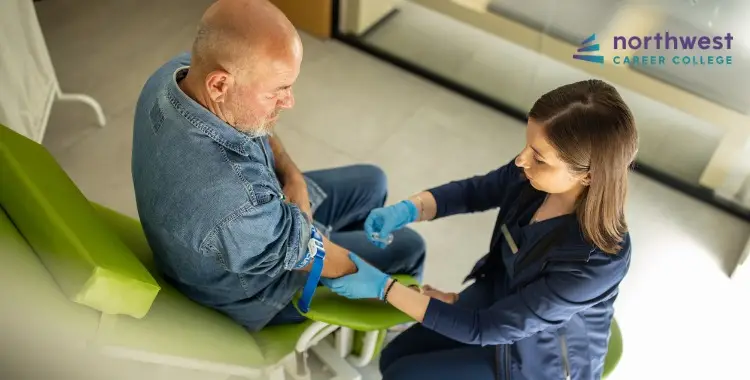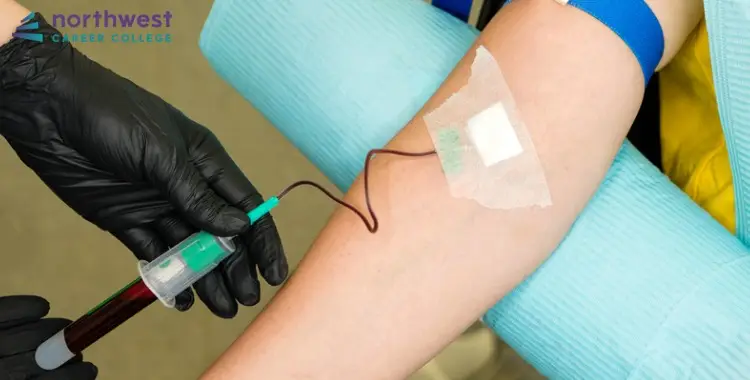Continuing Education: Keeping Your Phlebotomy Skills Sharp – Part 1
- Phlebotomy Technician
- March 25, 2024
- 2.4k views
- 4 min read

Are you currently working or considering going to school to pursue a career as a phlebotomy technician? Given that the basic mechanics of the phlebotomy industry have not undergone some of the same foundational shifts that have impacted other areas of healthcare, you may be wondering whether you need to incorporate continuing education courses as part of your professional development plan.
Even though the modern phlebotomy industry has been around for decades, some significant changes are coming that you should be prepared to face. Continuing education courses can help you stay sharp and ahead of the game. They can also help you expand your skillset so you can pursue more specialized positions related to venipunctures and other specimen collections.
This multi-part article will explain in detail the benefits of engaging with continuing education in hopes that you continue to invest in your professional development.
Table of Contents
What Courses are Most Popular?
Certain types of continuing education courses have historically been popular among phlebotomists. These are typically related to the evolving needs of the healthcare sector or the inherent requirements of the profession. The course categories below represent continuing education designed to enhance your skill set, knowledge base, and competency in providing patient care.
Phlebotomy Refresher Courses
Refresher courses are most commonly taken by phlebotomists who need to review the basics after an extended time out of the field. These courses typically cover the latest best practices in venipuncture, patient interaction, and safety protocols. If you recently attended a training program or are currently practicing in the field, you likely do not need refresher training. However, these courses can be very beneficial for specific individuals.
Advanced Phlebotomy Techniques
For phlebotomists who have been practicing in the field for several years, taking courses focused on advanced techniques may be beneficial. For example, a phlebotomist might seek additional training in complex drawing procedures, working with special populations (such as pediatric or geriatric patients), and difficult blood draw situations.
Some specific examples of difficult blood draw situations include palpation and needle insertion into small/obscure veins, adapting your technique for fragile veins, and recognizing and adapting to damaged veins. These may be more relevant in specific high-risk patient populations (e.g., individuals struggling with certain types of drug abuse) or high-risk medical settings (e.g., in surgical settings).
Infection Control and Safety
Infection control is a foundational concern in healthcare settings, so courses that address current best practices related to infection control can be beneficial. These courses address how to prevent the transmission of infectious diseases and maintain a safe environment for patients and healthcare workers.
Such training can be essential since formal guidance on specific aspects of infection control protocols can sometimes vary between federal agencies and/or other regulatory or advisory agencies. Over time, differences in guidance tend to be resolved, and continuing education courses are often a great place to learn the conclusions of such debates.
Legal and Ethical Considerations
Of course, as is true throughout the healthcare industry, phlebotomists must understand the legal and ethical aspects of their work, including patient rights, consent, and confidentiality. While regulations surrounding phlebotomy may not change as frequently as in other areas of healthcare, phlebotomists may benefit from periodically taking courses related to law and ethics so that they can confidently navigate these complex issues.
For the most current and popular continuing education courses, phlebotomists should consult professional organizations like the American Society for Clinical Pathology (ASCP) or the National Phlebotomy Association (NPA), which often offer or recommend relevant continuing education opportunities.
Conclusion
Continuing education offers numerous benefits to phlebotomy technicians. We spoke about a few of them in this article, and we will expand upon these concepts and more in Part 2 of this multi-part article. Stay tuned for more details next month!





